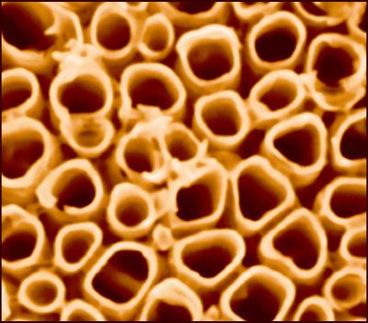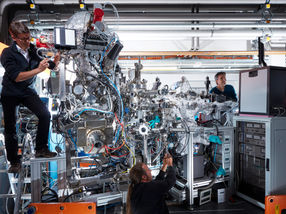Outperforming nature's water filtration ability with nanotubes
Advertisement
At just the right size, carbon nanotubes can filter water with better efficiency than biological proteins, a new study reveals. The results could pave the way to new water filtration systems, at a time when demands for fresh water pose a global threat to sustainable development. A class of biological proteins, called aquaporins, is able to effectively filter water, yet scientists have not been able to manufacture scalable systems that mimic this ability. Aquaporins usually exhibit channels for filtering water molecules at a narrow width of 0.3 nanometers, which forces the water molecules into a single-file chain.
Here, Ramya H. Tunuguntla and colleagues experimented with nanotubes of different widths to see which ones are best for filtering water. Intriguingly, they found that carbon nanotubes with a width of 0.8 nanometers outperformed aquaporins in filtering efficiency by a factor of six. These narrow carbon nanotube porins (nCNTPs) were still slim enough to force the water molecules into a single-file chain. The researchers attribute the differences between aquaporins and nCNTPS to differences in hydrogen bonding - whereas pore-lining residues in aquaporins can donate or accept H bonds to incoming water molecules, the walls of CNTPs cannot form H bonds, permitting unimpeded water flow.
The nCNTPs in this study maintained permeability exceeding that of typical saltwater, only diminishing at very high salt concentrations. Lastly, the team found that by changing the charges at the mouth of the nanotube, they can alter the ion selectivity.
Original publication
Tunuguntla, Ramya H. and Henley, Robert Y. and Yao, Yun-Chiao and Pham, Tuan Anh and Wanunu, Meni and Noy, Aleksandr; "Enhanced water permeability and tunable ion selectivity in subnanometer carbon nanotube porins"; Science; 2017
Most read news
Original publication
Tunuguntla, Ramya H. and Henley, Robert Y. and Yao, Yun-Chiao and Pham, Tuan Anh and Wanunu, Meni and Noy, Aleksandr; "Enhanced water permeability and tunable ion selectivity in subnanometer carbon nanotube porins"; Science; 2017
Organizations
Other news from the department science
These products might interest you

GFD®Lab Agitated Nutsche Filter Dryer by PSL
Laboratory Nutsche Filter Dryer for solid-liquid separation and scale-up development
Modular, all-in-one unit that supersedes traditional Büchner filtration and oven drying methods

Laboratory Glassware, Instruments & Accessories by Glassco Laboratory Equipments
High Precision Labware for Smarter Labs
Enhancing accuracy, compliance, and productivity in laboratories worldwide

Get the chemical industry in your inbox
By submitting this form you agree that LUMITOS AG will send you the newsletter(s) selected above by email. Your data will not be passed on to third parties. Your data will be stored and processed in accordance with our data protection regulations. LUMITOS may contact you by email for the purpose of advertising or market and opinion surveys. You can revoke your consent at any time without giving reasons to LUMITOS AG, Ernst-Augustin-Str. 2, 12489 Berlin, Germany or by e-mail at revoke@lumitos.com with effect for the future. In addition, each email contains a link to unsubscribe from the corresponding newsletter.






























































